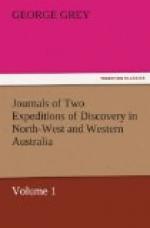Gold dust, I understand, is also procurable at Sandalwood Island and New Hebrides.
For vessels the good season on the coast is from about the 10th of April to the 15th of October.
Cootababa affords horses and all the produce of the other places. No duties are levied here, the place not being subject to the Portuguese. It is a small port and should be entered with caution.
The best ports of Timor for wax are Dili, Cootababa, Ocussi, Sitranny, Nilow, and Manatronto. It is gathered in June, cleaned in July, and sold principally in that and the two following months; but a vessel should be active, as enterprising people go along the coast and buy it up for the Kupang merchants, who send it to Batavia where it is said to sell for 120 rupees the picul; the price at Cootababa, being lately about 80 rupees at 2 1/2 to the Spanish dollar.
Sandalwood can be had from March to October, the usual trading season; but from March to May is the best time as vessels from Kupang and Macao are on the coast early, buying it up in time to return to Macao and China in the favourable monsoon. The best ports for sandalwood are, Cootababa, Ocussi, and Sitranny, but it is to be had most abundantly at Ata-poopa.
ARTICLES IN REQUEST.
Spanish dollars, muskets, and gunpowder are the essentials for procuring wax or sandalwood, but if you wish to have a greater assortment, small quantities may be added of any articles from the following list.
Doubloons (Spanish). Sovereigns (English). blue cloth of Pondicherry of good quality. ditto English (if cheap) of dark colour for officers. white shirting or good calico for men and women. handkerchiefs of colours and sorts. white cotton stockings. men and women’s gown pieces of sorts and colours. silk stockings, plain and ribbed. shoes for men and women. brandy, rum, gin, lead and flints. quart-glass decanters, cruet stands, dress swords, wine glasses and rummers, knives and forks, razors, needles, scissors, earrings, bracelets, shawls of sorts, mock jewellery, sugar, soap, biscuits.
Bally and Surabaya are good places for rice, but more especially the former, as it is to be had cheap, especially if bartered for opium. The rice can be carried to Macao where a good price can always be obtained for it.
Puloo, Batao, and Ocussi on the coast of Timor are good places for obtaining tortoiseshell at all times, as well as the islands in front of Timor, from October to December. The price is about 800 Spanish dollars per picul in cash; but in exchange for blue or white cloth, powder, arms, flint, etc., it would be obtained for much less.
Roti and Bally are both good places for ponies in exchange for cash or goods.
The following is an account of our purchase and barter at the island of Roti in January 1838:
10 horses for 10 muskets (old). 4 horses for 2 fowling-pieces (old). 9 horses for 27 1/2 rupees each. 3 mares for 22 rupees each. 8 sheep for an old regimental breastplate. 14 goats for a pair of pistols (old). The duty on each horse was six rupees.




